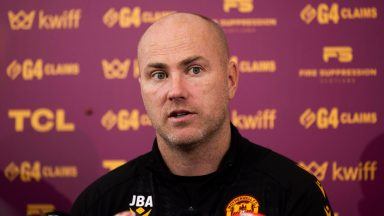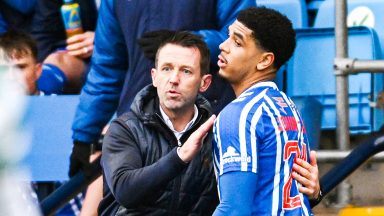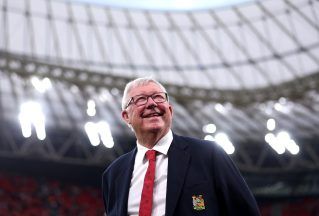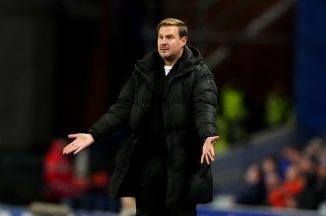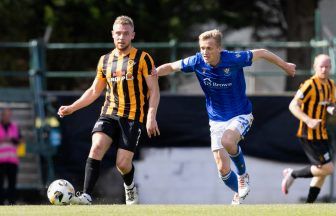Boli Bolingoli’s shorts may have been eye-catching, his £2000 suitcase remarkable and his Balenciaga hoodie designed to draw comment, but his facemask was the piece making a statement.
As the Celtic defender was pictured on a flight to Spain he was dressed like he was following the rules like the rest of us. The reality is that he was gambling with the immediate future of Scottish football.
One newspaper headline called Bolingoli “Celtic’s Covidiot”. His decision to fly abroad on his two days off, fail to quarantine or tell his employer about his trip, and then play against Kilmarnock on Sunday, was proof positive that moronavirus is a clear and present threat to the health of the national game.
The First Minister had made her unhappiness and annoyance clear when the ‘Aberdeen Eight’ were caught out in breach of the rules last week.
The revelations about Bolingoli’s trip took things a step further. Scottish Conservatives leader Douglas Ross may be a qualified referee but Nicola Sturgeon was every bit the official in charge when she told clubs they were on a yellow card and “next time it will be red because you will leave us with absolutely no choice”.
Within hours Celtic and Aberdeen’s next two matches were called off, with Scottish football’s Joint Response Group saying the decision was made when “a request was received” from the Scottish Government. This wasn’t a request so much as an offer they couldn’t refuse.
So was it a public health decision or a punishment? It was a bit of both.
A local lockdown in Aberdeen city meant that the Dons’ game was never certain to go ahead, especially after their players had caused the postponement of last Saturday’s match against St Johnstone.
Celtic’s match against St Mirren being shelved is probably best filed under “something had to be done” in the wake of Bolingoli’s transgressions. The fact that Celtic and Aberdeen were then scheduled to meet on Saturday made a second postponement an obvious choice.
The action won’t end there, and the response to these incidents will signal a significant change in the footing of the SPFL and the SFA as they look to protect the game from itself and from the doomsday scenario where the government stops all football again.
Until now, the effects of the pandemic have been dealt with by the Joint Response Group, set up by the league and governing body to pool their efforts to help clubs through a health crisis and its potentially devastating financial impact. It’s been Hampden in rescue mode: benevolent, supportive and protective.
The Scottish Government’s warning will change the emphasis. The JRG’s work will continue but the job of policing the game will now become an equal priority.
Players endangering the careful planning won’t go unchecked now and the SFA and SPFL will now have to reach for the rule books to show everyone that they are doing what they can.
Bolingoli has been fined by the police and will be heavily disciplined by his club for actions Celtic boss Neil Lennon described as “rogue”, “selfish” and “stupid”. Aberdeen have been adamant that they will take action on their players.
That won’t be enough. Reports on Wednesday have the SPFL looking to ratify new rules and powers to allow it to deal with these sorts of issues and the sanctions it could impose might be limitless.
That would be too late for the existing cases but it would be no surprise if the SFA’s compliance officer brought charges against Bolingoli and the eight from Pittodrie. In addition to the famous rule about bringing the game into disrepute, the governing body has one that compels players to “act in the best interests of Association Football”. It’s hard to imagine the Celtic player finding a lawyer willing to tackle that one.
It’s how the SPFL deal with clubs that will make for interesting reading. Missed and late tests will no longer be tolerable and major rule breaches will be considered disastrous but the league will have to decide if it has an appetite for calling clubs to account and how that might be achieved.
Celtic and Aberdeen have been appalled, angry and apologetic about the embarrassing behaviour of their players. There’s no suggestion they have been lax in their approach to the problem, nor that there’s any fault in the safety protocols at either club.
The SPFL is, of course, entitled to assign responsibility and impose sanctions as a deterrent. With so much at stake and after such high-profile breaches of trust it’s almost expected that it does. But to hold the clubs responsible even if they have taken all precautions isn’t popular among the clubs. We know this from failed moves to bring in such “strict liability” where offensive behaviour and racist or sectarian songs are sung.
There’s no guarantee the league will decide to go down that road but their next steps will be decisive in whether or not there’s a smooth return to competition or a shambles that leads to shutdown.
In normal circumstances Bolingoli would have a key role to play on Celtic’s left flank, using his abilities to help the team transition from defence to attack. Instead, his decision to disregard the rules has prompted a shift in attitude from all concerned with the Premiership and that change in tack could yet prove devastating.


















